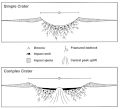Ralph Belknap Baldwin
Ralph Belknap Baldwin | |
|---|---|
 Baldwin being interviewed in 1998 | |
| Born | June 6, 1912 Grand Rapids, Michigan, United States |
| Died | October 23, 2010 (aged 98) Grand Rapids, Michigan, United States |
| Nationality | American |
| Alma mater | University of Michigan |
| Known for | Showed that lunar craters were the result of impacts, not volcanic in origin. Two of his books were highly influential and helped establish lunar timescales. |
| Awards | Army Chief of Ordnance Award (1945) G.K. Gilbert Award (1986) J. Lawrence Smith Medal (1979) Leonard Medal (1986) Barringer Medal (2000) |
| Scientific career | |
| Fields | Lunar science Manufacturing |
| Institutions | Johns Hopkins University Oliver Machinery Company |
Ralph Belknap Baldwin (June 6, 1912 – October 23, 2010)[1] was an American planetary scientist known for his work on lunar craters, beginning in the late 1940s.[2] His book, The Face of the Moon[3] made the case for the impact nature of lunar craters.[4] He published The Measure of the Moon in 1963.[5]
Prior to his lunar work he was Senior Physicist at Johns Hopkins University's Applied Physics Laboratory during World War II working on the proximity fuze.[2] In 1947 he began working for Oliver Machinery Company. In 1970 he became president of the company and chairman of the board in 1982. He retired in 1984.[6] He died on October 23, 2010.[2]
Early life
[edit]Baldwin was born in Grand Rapids, Michigan. He attended the University of Michigan, receiving his B.S. in 1934, M.S. in 1935, and Ph.D. in 1937,[1] on the "spectroscopic study of novae".[7] After graduation, he taught astronomy at the University of Michigan, University of Pennsylvania, and Northwestern University from 1935 through 1942.[6] The photographs at the Adler Planetarium, where he lectured to earn extra money, sparked his interest in lunar craters. This led to an article in Popular Astronomy in 1942 and later his book The Face of the Moon, in 1949.[8] During World War II Baldwin helped to develop the radar proximity fuze. He published a history of proximity fuze development in 1980 entitled The Deadly Fuze.[9]
Awards and honors
[edit]Baldwin has been honored for each of his three careers. During his work on the radio proximity fuze he was awarded the Army Chief of Ordnance Award and the U.S. Naval Bureau Ordnance Award (1945).[1] In 1947 he was a recipient of the Presidential Certificate of Merit.[1] He was elected a Fellow of the American Academy of Arts and Sciences in 1980.[10]
In planetary science he has been awarded the Barringer Medal (2000), Leonard Medal (1986), G.K. Gilbert Award (1986) and the J. Lawrence Smith Medal (1979).[1][2]
The Ralph B. Baldwin Award by the Wood Machinery Manufacturers of America was established in his honor.[11]
References
[edit]- ^ a b c d e Who's Who in America [Marquis]. 56th edition, 2002. New Providence, NJ: Marquis Who's Who, 2001.
- ^ a b c d "Ralph Baldwin Obituary: View Ralph Baldwin's Obituary by Grand Rapids Press". Obits.mlive.com. 1912-06-06. Retrieved 2014-03-09.
- ^ Baldwin, Ralph Belknap. 1949. The Face of the Moon. [Chicago]: Univ. of Chicago Press
- ^ "the-moon - Baldwin". The-moon.wikispaces.com. 2010-12-10. Retrieved 2014-03-09.
- ^ Baldwin, Ralph Belknap. 1963. The Measure of the Moon. [Chicago]: Univ. of Chicago Press. 508pp. ISBN 978-0226036069
- ^ a b "Archived copy" (PDF). Archived from the original (PDF) on 2010-11-29. Retrieved 2010-11-29.
{{cite web}}: CS1 maint: archived copy as title (link) - ^ Hockey, Thomas (2009). The Biographical Encyclopedia of Astronomers. Springer Publishing. ISBN 978-0-387-31022-0. Retrieved August 22, 2012.
- ^ [1] Archived January 3, 2011, at the Wayback Machine
- ^ Baldwin, Ralph B. The Deadly Fuze: The Secret Weapon of World War II. Presidio Press. San Rafael, CA 1980. ISBN 0-89141-087-2. Baldwin was a member of the team headed by Merle Tuve that did most of the design work.
- ^ "Book of Members, 1780-2010: Chapter B" (PDF). American Academy of Arts and Sciences. Retrieved 9 May 2011.
- ^ [2] Archived September 28, 2010, at the Wayback Machine


 French
French Deutsch
Deutsch
